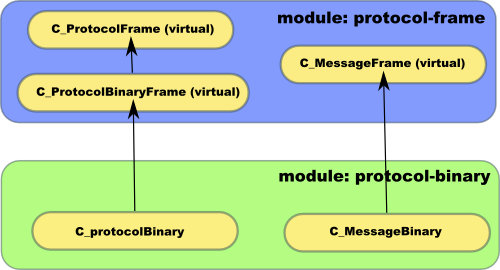Seagull - Developer
- Developer documentation
- Main modules
- Other modules
- Main objects
- Threads
- Protocol and messages
- XML parsing
- Channel creation
- Multi-channel policy
Developer documentation
The purpose of this documentation is to explain Seagull interns. It is a summary to help developers make their way through Seagull and not intended to be a definitive developer documentation.
Main modules
- generator-core: core of Seagull. Contains the main functions.
- generator-model: internal model of Seagull to manage protocols, channels and transports.
- generator-scenario: model for the scenario
- generator-traffic: traffic model. Management of the call context, of the read/write on transport channel, of the execution of the calls.
- protocol-data: definition of generic data used by the generator
- protocol-frame: virtual definition of a protocol and its messages. It contains the only objects that will be used by the generator
- transport-frame: generic definition of a transport
Other modules
- common: contains all the .h files to adapt some system includes to the target compilation platform
- data-log: deals with response time logs (csv file)
- exe-env: execution environment for each protocol
- external-data: manage external data files, to insert data into scenario messages during the call
- generator-common: utils for the tool (buffer management, id, ...)
- library-trans-extsctp: SCTP transport library; daughter class of C_Transport
- library-trans-ip: IP v4 & v6 transport transport; daughter class of C_Transport
- protocol-binary: binary protocol definition (e.g. Diameter); daughter class of C_ProtocolBinaryFrame, C_MessageFrame
- statistics: stats management
- xml-parser: parsing the xml files (dictionary, scenario and configuration file)
Main objects
- C_Generator (module generator-core): Main object
- C_ReadControl (module generator-traffic)
- C_CallControl (module generator-traffic): Objects for the execution of the scenario
- Protocol objects:

- C_ProtocolControl (module generator-model): The only object that knows about the non-virtual message and protocol objects.
Threads
There are 5 threads in Seagull:
- One thread that handles the whole traffic,
- One thread for the keyboard,
- One thread for the tool display,
- One thread for the logs,
- One thread for the statistics.
They are handled in generator-core module
Protocol and messages
- To implement a text protocol, you need to create a new implementation of C_ProtocolFrame and C_MessageFrame like C_ProtocolBinary and C_MessageBinary
- In those classes, you implement the management of the XML tags and the protocol definition
- You need to add them in C_ProtocolControl to be instantiated by the tool
XML parsing
- Handled in module xml-parser
- XML files are parsed by C_XmlParser
- XML data are represented as a tree of elements (based on stl types): (<TAG (FIELD=“VALUE”)*> <\TAG>)*
- Useful functions in C_XmlData allows to get the name of a tag, retrieve the value of a field or the list (stl) of element under one element.
Channel creation
- C_TransIP (module library-trans-ip) implements the transport, based on virtual object C_Transport (module transport-frame)
- Done/Declared in conf file.
- Channel = link between one protocol and one transport, with an open command for the transport
Multi-channel policy
Automatic session based: possible to open several channels (using same or different protocols), but only the first channel used can be server.


